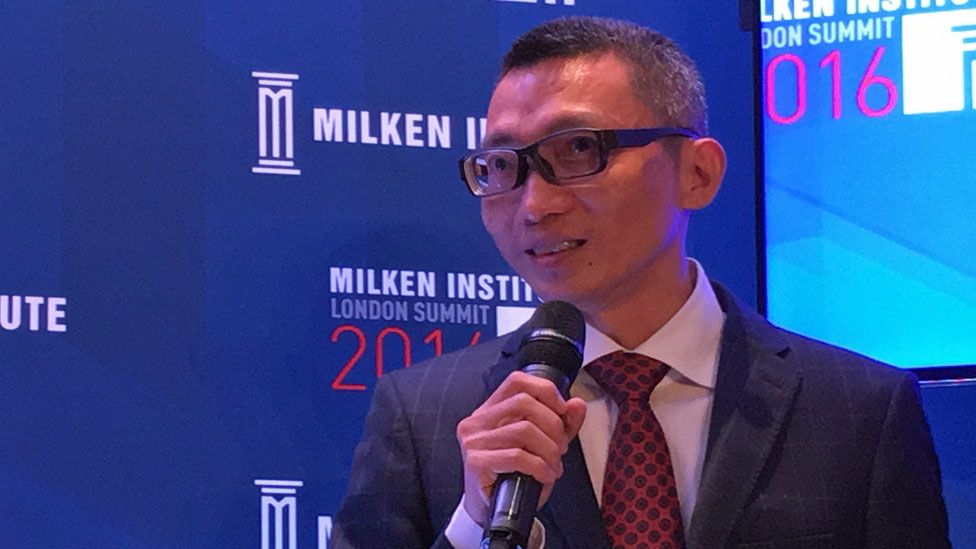Chinese billionaire offers biggest education prize
- Published

A Chinese technology billionaire is offering the world's most valuable education prize.
The Yidan Prize will award nearly $8m (£6.64m) every year to two research projects that have the potential to "transform" global education.
Charles Chen Yidan, who co-founded China's internet company, Tencent, wants to use the prize to scale up innovative education research projects and replicate them across the world.
Universities, governments and think tanks have reacted enthusiastically to the prize, and leading US institutions like Harvard and MIT have already submitted several nominations.
But the winner might not necessarily be a household name in education. Even a local project could win the prize, if it can prove it has been effective.
"As long as an idea is replicable in other regions, we can give them an award," says Mr Chen.
More than exams
Mr Chen, now aged 45, became one of China's richest men after co-founding Tencent in 1998. In 2013, he stepped down to focus on educational philanthropy.
His interest in education came from his family. His grandmother was illiterate but insisted that Mr Chen's father got a good education.
Mr Chen himself studied applied chemistry as an undergraduate at Shenzhen University and took a master's degree in economic law at Nanjing University.
His educational philosophy has also been shaped by the "tremendous pressure" he felt while studying for China's "gaokao" higher education entrance examinations.
So he set up Wuhan College, a private university in China, which focuses on "whole-person development" rather than rote-learning and examinations.
More stories from the BBC's Global education series looking at education from an international perspective, and how to get in touch.
You can join the debate at the BBC's Family & Education News Facebook page.
The college aims to train talented students to join China's technology industry.
Executives from Tencent helped to design the college's curriculum, recruit students and teach classes, so that its graduates are trained in the skills required by employers.
But Mr Chen was frustrated that this college only reached a limited number of students. So he decided a global education prize would be the best way to improve education for millions of young people.
Future trends
Mr Chen, speaking on a tour of Europe to promote the prize to universities, governments, NGOs and think tanks, says he has already been inundated with nominations.
He wants the prize to focus the attention of universities and governments on future trends in education.
"We find that no matter whether people come from a rich or developing country, in the east or the west, they are talking about similar concerns," says Mr Yidan.
These are questions about children from rich families having the best access to education, and whether students in some countries face too many exams.
The prize-winners will be chosen by an independent committee of educational experts led by Dr Koichiro Matsuura, former director-general of Unesco.
They are looking for nominations that are innovative and sustainable, that reform existing educational structures, and that respond to what might be the future challenges for education.
Grey power
But Mr Chen also has his own ideas about how to improve global education.
Speaking through a translator but occasionally breaking into English to reinforce a point, he said he wants to find ways to make the most of the expertise of retired teachers.
"They are a valuable resource that we need to make better use of," he says.
He thinks that collecting "big data" on students can improve the education that individual students receive.
"By analysing big data, we can find bespoke ways to help pupils in need," he says.
Unsurprisingly for the co-founder of an internet company, he believes that technology will transform education.
This latest education prize is now the most valuable.
The Global Teacher Prize, run by the Varkey Foundation, gives $1m (£830,000) annually to a teacher who has made an "outstanding contribution" to education.
The Broad Prize for Urban Education, which ran from 2002 to 2014, gave $1m every year to a school district in the US that significantly improved the academic performance of low-income and minority students.
The WISE Prize for education, supported by the Qatar Foundation, awards $500,000 (£415,000) to the winning laureate.
Long-term investment
But is a prize really the best way to improve education?
Dan Sarofian-Butin, founding dean of the school of education and social policy at Merrimack College in Massachusetts, says that prize money can be a poor way of achieving change.
"Rather than give a one-off cash prize, I hope the Yidan Prize will nurture and sustain its winners over a period of years," he says.
"If you look at the TV show Dragons' Den, or Shark Tank in the US, what the winners really get is not just the investment money from the sharks, but their expertise, their network of contacts and firms, their foot in the door with many companies, and their national exposure.
"Likewise, a really powerful education prize would create a mechanism that fostered exactly such mentoring, networking, and sustainability."
Andreas Schleicher, education director at the OECD, welcomes the Yidan Prize as an incentive for innovation in education.
"When we surveyed teachers, less than a quarter of them said they would be recognised for greater levels of innovation," he said.
"The highly industrial and compliance-based organisation of education generally means that even where good ideas are generated, they don't scale and spread."
Nominations close at the end of March and the winners will be announced in September.